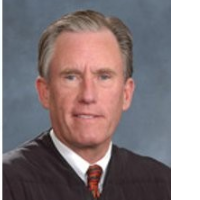Court Supports Ohio’s Elimination of Early Voting
 Judge David McKeague (photo: Michigan State University)
Judge David McKeague (photo: Michigan State University)
By Kevin Koeninger, Courthouse News Service
CINCINNATI (CN) — Dismissing the Democratic Party and minority voters' disenfranchisement claims, the Sixth Circuit on Tuesday upheld Ohio's elimination of a week of early voting.
The Ohio Democratic Party, among others, claimed Governor John Kasich and other Republicans had placed an undue burden on black voters when they passed Senate Bill 238 and eliminated the state's "Golden Week" of early voting in 2014.
Golden Week was a seven-day period during which voters could register and vote on the same day.
U.S. Circuit Judge David McKeague, writing for a divided three-judge panel, commended the state for being "a national leader when it comes to early voting opportunities," and reminded the Ohio Democratic Party that the law in question was "the product of a bipartisan recommendation ... [and] the product of collaborative processes."
The federal court for the Southern District of Ohio initially ruled (pdf) that S.B. 238 violated the Equal Protection Clause of the Constitution, and the state appealed.
Judge McKeague blasted the lower court's ruling, writing that "[t]he undisputed factual record shows that it's easy to vote in Ohio. Very easy, actually."
"Ohio's early voting system, as amended by S.B. 238, is one of the more generous in the nation . . ." he continued. "When compared to the thirteen states . . . that do not permit any early in-person voting days, an Ohioan's path to voting is open and easy, not burdensome." (emphasis in the original)
Judge McKeague's 27-page opinion further denigrated the lower court's refusal to compare Ohio's voting processes with those of other states.
"While comparisons with the laws and experiences of other states may not be determinative of a challenged law's constitutionality," he wrote, "to ignore such information as irrelevant is to needlessly forfeit a potentially valuable tool in construing and applying 'equal protection of the laws,' a constitutional standard applicable to all the states." (emphasis in the original)
The opinion also defended the state's rationale in passing the law, which meant to reduce voter fraud, reduce election costs and administrative burdens and increase voter confidence.
While Ohio's Democratic Party argued that the state failed to provide proof that the elimination of Golden Week advanced these interests, Judge McKeague dismissed the need for such evidence.
"The district court demanded too much evidence. For regulations that are not unduly burdensome, the Anderson-Burdick analysis never requires a state to actually prove 'the sufficiency of the 'evidence.''"
The Anderson-Burdick analysis comes from Anderson v. Celebrezze and Burdick v. Takushi, two landmark Supreme Court cases dealing with voting rights.
McKeague described the Party's desire to "adopt a broad rule [where] any expansion of voting rights must remain on the books forever" as "an astonishing proposition."
"Such a rule would have a chilling effect on the democratic process: states would have little incentive to pass bills expanding voting access if, once in place, they could never be modified in a way that might arguably burdensome segment of the voting population's right to vote," McKeauge said.
U.S. Circuit Judge Richard Allen Griffin joined McKeague in the lead opinion, but Judge Jane Branstetter Stranch broke with the majority.
Stranch underlined the importance of evidence and expert testimony collected during the district court's 10-day bench trial.
"Both the [evidence and testimony] and the substantial support found in the record stand in opposition to the majority opinion's blithe assertion 'that it's easy to vote in Ohio. Very easy, actually,'" she wrote in her 15-page dissent.
Stranch also took issue with the majority's reliance on comparisons between the early in-person voting systems of Ohio and other states.
"Simply stating that Ohio's early voting system is 'one of the more generous in the nation' provides little helpful information. It fails, for example, to account for the rate at which early voting is actually used by different populations, let alone how the voting options in other states might impact the comparison. In most respects, this issue is local and dependent on the particular circumstances of Ohio's law and its population. Analysis of the burden that S.B. 238 places on Ohio voters thus necessarily entails engaging with the factual record. The majority opinion fails to perform that essential work."
To Learn More:
Ohio Democratic Party, et al., v. John Husted, et al. (U.S. Court of Appeals for the Sixth Circuit)
Republican-Backed Ohio Law Eliminating Early Voting Ruled Unconstitutional (by Ann Sanner, Associated Press)
Ohio Disenfranchises Voters Who Skipped 2012 Election, Suit Claims (by Kyle Anne Uniss, Courthouse News Service)
Federal Judge Orders Ohio to Reinstate Early Voting (by Steve Straehley, AllGov)
Ohio Secretary of State Fought to the End to Exclude Provisional Ballots (by Noel Brinkerhoff and David Wallechinsky, AllGov)
- Top Stories
- Unusual News
- Where is the Money Going?
- Controversies
- U.S. and the World
- Appointments and Resignations
- Latest News
- Trump Renames National Football League National Trump League
- Trump to Stop Deportations If…
- Trump Denounces World Series
- What If China Invaded the United States?
- Donald Trump Has a Mental Health Problem and It Has a Name






Comments